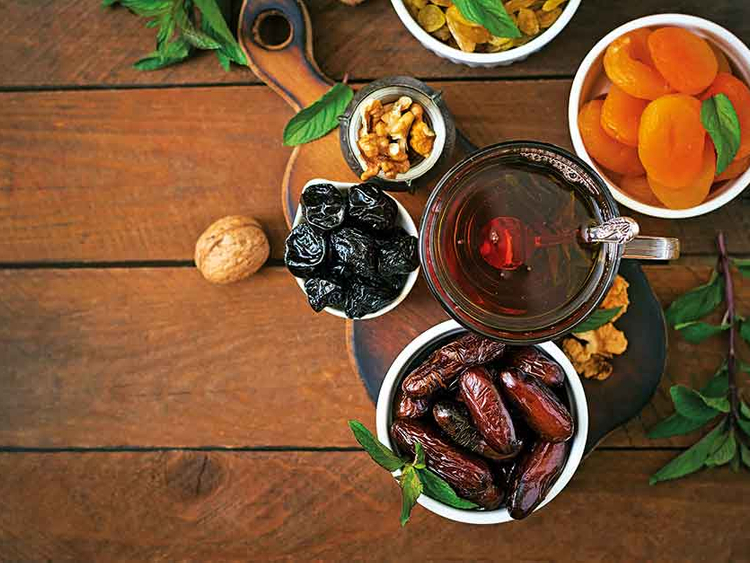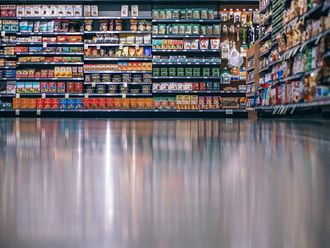As we draw towards the middle of the holy month, some people will start to feel their energy levels dropping. Yet Dubai-based founder of Chef On The Block, Najoud Al-Jabri, insists that Ramadan should be a period of healthy choices and there’s even an opportunity to shed a few pounds.
How do you keep your energy levels high during Ramadan?
Fasting gets a little more tiring as the weeks pass, but it also depends on how you’ve chosen to fast and the way you eat or rest.
A lack of energy can be an accumulation of people not sleeping proper hours, not eating the right food and overeating during iftar. People break their routines, staying up late and then waking up to eat again.
Usually, if you have a lot of food laid out in front of you, whether you’re going to buffets or a friend’s place, it’s so easy to lose track of what you’re eating.
I always start with water and dates, just as I do on a regular day, when I’m not fasting, and I’ll have a lot of soups and salads. Usually, we’ll stay sitting by the table and then take a break, have a conversation and eat a little more later.
I usually break for between 15 and 20 minutes, to give my body time to absorb the food. It also gives me a better understanding of how hungry or full I am feeling.
How do you manage to avoid the temptation to overeat?
If you eat too much in one sitting you don’t have an understanding of what your body needs and then you end up with stomach aches or not feeling very well. You should eat dried fruits but you should
keep it in proportion as otherwise you’ll be consuming too much sugar.
I recommend consuming grains and seeds. What I’ve been doing is making energy balls, which contain ingredients such as oats, flack seeds, and peanut butter. You can also use sesame seeds and coconut oil. It’s an easy way to consume high-energy foods if you’re not in the mood to prepare a complicated dish.
Dairy products, such as eggs, yogurt and labneh are also good for your body as they keep you full for a long time. Avocados and bananas are also good options.
Even when you are at a friend’s house, there’s always the pressure to offer variety. You’re not supposed to consume food to compensate for the food you won’t be eating during
the rest of the day. You should approach iftar as one meal, where you have the chance to eat again later.
Dehydration can often leave people fatigued. How would you recommend maintaining hydration during daylight hours if you’re not keen on plain water?
To hydrate, it doesn’t always have to be water. It could be fresh fruit juices but you should limit it to one glass and you shouldn’t add sugar. It’s important to have some sugar in your body to energise yourself, but consuming too much during Ramadan, as with any other day, is not good for you. Another important factor is hydration — drinking water or eating fruits like watermelons should help!
Do you approach suhour differently to iftar?
For me I have a heavier meal for iftar, even though it takes longer to consume that meal. For suhour, I used to wake up, eat something and then go back to sleep but then I realised that I was getting hungry when I woke. It was like eating breakfast but skipping lunch. Now, an hour before I go to sleep, I will eat something light and then have something hydrating, such as soup or fruits.
Sometimes, I’ll have a small amount of carbohydrates with labneh or yogurt. If I heat a heavier meal, then I won’t sleep well or function well the next day. My body doesn’t need anything heavier but some people need food such as rice.
For suhour, I wake up before the prayer in the morning and have some water before my day starts and then I go back
to sleep.
Are there any foods you should be careful with at iftar?
Sometimes soup and salads have surprisingly high salt content. I would recommend trying a small amount first to check if there’s too much salt. Sometimes the people who are preparing food are also fasting, so they can’t taste the food.
How do you approach exercise over the holy month?
For me personally, I like to exercise just before iftar. It helps me to burn fat and it doesn’t torture my body because after a quick shower and, I can eat and drink. During the workout, I can’t drink but just after it, I can eat and drink what my body needs. The intensity of a workout depends on the individual and also on what each person’s body is used to.
If you’re used to a high-impact workout and you don’t feel the need to have water on the spot, then you should be fine. Moderate exercise for an average person is good but if you can push yourself, then that would be great as well.
What’s your mental approach to fasting?
When you’re working, it’s easy to get distracted and not realise the amount of time you have been fasting for. If you’re focussed on the time and how many you have left until you can break your fast, then,
of course, you’re going to feel hungry.
I like to be productive. Many people would rather sleep or kill time but there are so many different ways to be productive. For me, that’s the whole reason of Ramadan. It’s about living a day in the life of someone who’s less fortunate and how they have to be productive on a regular day.
For healthy Ramadan recipes, visit www.chefotb.com











